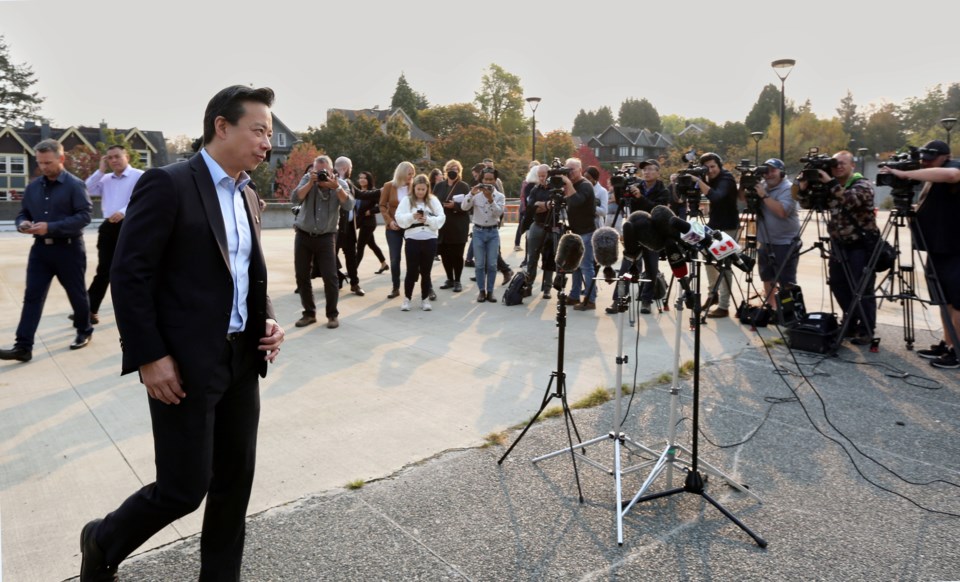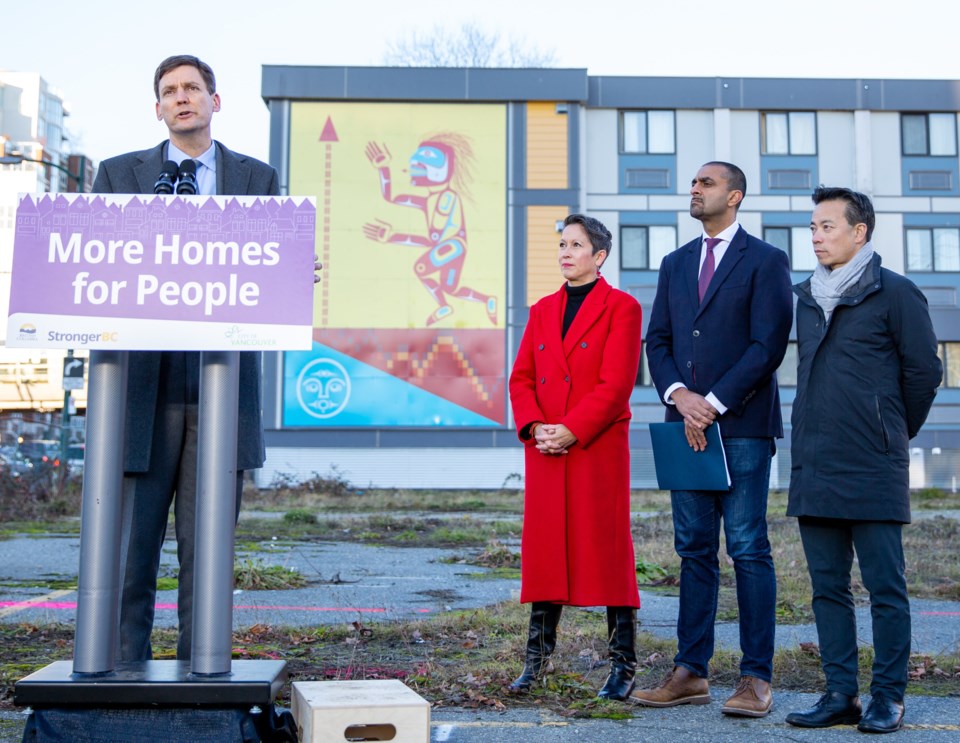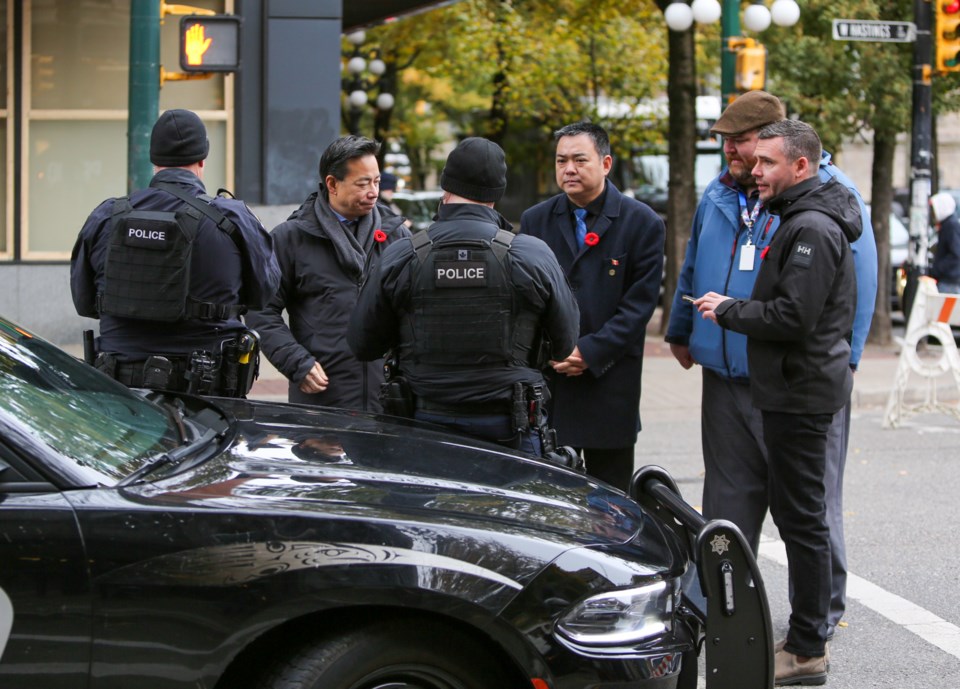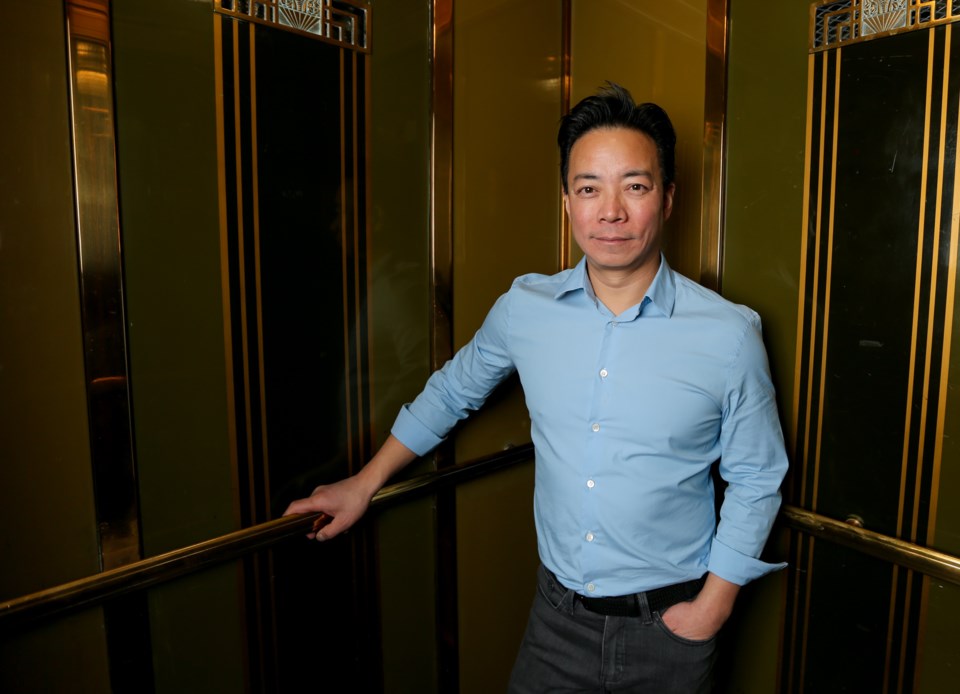Hit with a firehose of information is how Ken Sim described his first couple of months on the job.
The 52-year-old rookie mayor, who was elected Oct. 15 and inaugurated Nov. 7, expected a heavy workload coming into city hall, but admits it’s been a bit overwhelming.
“You wake up one day and you find out not only are you the mayor of the city of Vancouver, but you're also chair of the police board, you're on the board of Metro, you're on the mayors’ council [on regional transportation],” said Sim in a year-end interview from a boardroom at his office at city hall.
“At the end of the day, it's not that it's super complicated, it's just a lot all at once.”
The orientation process coupled with running council meetings, where his ABC Â鶹´«Ã½Ó³»party has pushed through a pile of motions related to public safety, housing, childcare, development, seniors, Chinatown and the Jewish community, has made for a torrid pace.
Sim has also met with provincial and federal ministers, various community organizations and attended two news conferences with Premier David Eby, who recently thanked the mayor, council and city staff for expediting the government’s plan to open 90 units of work camp-like temporary housing in Vancouver.
Sim reflected on his time in office in a recent half-hour interview, which occurred on his 45th day as mayor.
A condensed and edited version of the interview is what follows.

Is it the job you thought it would be?
It's different. We ran through the election at 100 miles an hour, and then we didn't take a breath. I think I got home at about three o'clock on the Sunday morning [after election night Oct. 15] and we were working on transition Sunday afternoon. We didn't have a transition team provided by the city. In fact, we didn't get email addresses, phone numbers, office space, what-have-you until Nov. 7. So we basically had to build the whole transition team on our own. That was a great adventure. It's not a knock [on the city], but one thing I will do when my time comes to leave is we'll make sure we set up the next mayor for success.
I was going to ask what has been your biggest challenge so far, but it sounds like you just answered it.
I think that was the biggest challenge, but there have been a lot of surprises — like a lot of pleasant surprises.
Can you give me an example?
I would say that all the politicians I've met — when it comes to the premier’s office, the prime minister's office, all the local mayors, all the local councillors and even the non-ABC Â鶹´«Ã½Ó³»councillors in the chamber — they’ve all been incredibly generous of spirit.
That surprises you?
It's not that it was a massive surprise. It’s more like, ‘Wow, there are a lot of people here who genuinely have hopes and dreams, and they want to do right by the city or the province or the country.’ And we've been working incredibly collaboratively together.
I know it’s early days — and you just referred to them in your previous response — but how would you describe your relationship with the unofficial opposition comprised of councillors Pete Fry, Adriane Carr and Christine Boyle?
From my perspective, I think it's awesome. I have a lot of respect for all the councillors in that chamber, including Christine, Pete and Adriane. At ABC Vancouver, we're post partisan. So it doesn't really matter what party you're from. I think the proof is in the pudding. So when we work collaboratively with the premier's office, or when we support Christine Boyle’s motion on housing, which didn't make it through the last council and it makes it through our council unanimously — and we gave her a standing ovation after — I think that goes a long way to proving that we truly are post partisan, and we work collaboratively. If they're good ideas that address the biggest challenges or opportunities in our city or the region or the province, we’ll support them. (Note: Boyle’s motion was passed with amendments from ABC Â鶹´«Ã½Ó³»Coun. Mike Klassen and input on tenant protection from Fry and Carr.)
Your predecessor Kennedy Stewart reached out to former mayor and premier, Mike Harcourt, for guidance, among others. Do you have a mentor?
It really depends on the situation. But once again, I can tell you so many people have been generous of spirit — former mayors of the city, former premiers of the province, politicians of all political stripes have offered their support.
With a majority comes great responsibility. I know voters gave you an overwhelming mandate to govern, but at the same time, not everybody voted for you. Give me an idea of ABC Vancouver’s approach to governing over the next four years. Is it going to be a slam dunk on everything you guys do? Or is there going to be room for other voices?
I think we've already displayed that there's room for other voices. I mentioned Christine Boyle's motion, which we supported. We don't want to be in an echo chamber. We actually celebrate diversity of thought. That's what makes us stronger. But we put a 94-point plan out to the city [during the election campaign] and voters gave us an overwhelming mandate. People talk about [a poor] voter turnout, and there's not much we can do about that. But what I can tell you is we got the most votes out of any mayor in the history of Vancouver, and all of our councillors, park board and school board candidates basically won all the races by a lot. So the people that did come out to vote, they made their voices heard. This is what they wanted. They voted for the movement. They didn't vote for any one person. And so it's our responsibility to deliver that mandate.
It was your own chief of staff, Kareem Allam, who described ABC Â鶹´«Ã½Ó³»as a party similar to the once-dominant Vision Vancouver, except that you guys like cops more. Is that accurate?
I’ll use different words. If you look at the colours of our logo [which was created by Sim’s communications director Taylor Verrall], the colours are red, a very light shade of blue and orange. That represents the three main political parties. And if we were called ABCD Vancouver, the D would be green. We're a bunch of individuals who leave our political stripes at the door, and the focus is doing right by the city. Because at the end of the day, there's no left, centre or right when it comes to having safe streets, vibrant neighbourhoods, garbage taken out, potholes fixed, getting a permit quicker, having a city that is livable — these shouldn't be ideological things. They’re just common sense.

Tell me how the decision came about to announce the 90 units of work camp-like housing for two locations in Vancouver. Did you have a role in making that happen?
There were some in-camera conversations that I obviously can't disclose. But what I can tell you is that we were very clear during the election campaign, and will be very clear over the next four years — or however long we're in office — that we support housing for all sectors. Supportive, market, rental, co-op. In this case, the province wanted to move very quickly and we committed to working very quickly to live up to our end of the partnership. When all levels of government have an objective, and you work collaboratively together, and you put politics aside, amazing things can happen quickly.
We’re doing this interview on one of the coldest days of the year. I saw on Twitter that you and some of the councillors visited warming centres last night (Dec. 21). What did you say to those people last night, or what do you say to the people sleeping outside who want a warm place to live today?
We learned a lot [from our visits]. There are a lot of good things that are going on in our city, but there are a lot of things we can improve. The one big thing I learned was the earliest a warming centre opens up is seven o'clock at night. When it’s -6 or -10 outside, we can do better.
So does that mean you’re going to direct staff to open warming centres earlier in the day or evening?
We’re going to push, but we also learned there are different levels of government that have a say in it. We have to have those conversations. But at the end of the day, someone living outside doesn’t care what level of government is responsible for it. It's a safety issue and life and death for a lot of people. As long as I'm mayor of Vancouver, that issue gets thrown on top of the priority pile because a lot of people are affected.
Overdose deaths. Kennedy Stewart pushed for decriminalization (which comes into play at the end of January), safe supply and more overdose prevention sites. What are your plans to address the crisis over the next four years?
We put the call out during our inauguration, saying that the City of Â鶹´«Ã½Ó³»cannot solve this issue on its own, and we need all levels of government to step up. A few days later, [Premier David Eby] said that they're going to take oversight of this whole issue [in the Downtown Eastside]. So our role is to be a great partner to augment what the province is doing and what the federal government is doing. The premier’s office brought up the 90 supportive housing units and said they needed our help, and asked if we can make this happen quicker. I was like, absolutely. We support decriminalization. So we're not going to be playing politics, we're going to do everything that we have control over to make the situation better.
Will there be a property tax increase in 2023?
You know, it's looking like it. We're taking a fine tooth comb to the entire budget. We're being incredibly thoughtful and asking the right questions there. No knee jerk reactions. But what I can share with you is that we're inheriting some very challenging situations. Approximately half the budget is not City of Â鶹´«Ã½Ó³»stuff — when you look at taxes and utility fees like Metro Vancouver, the provincial school tax; we have no control over what they decide to do to increase rates or not. So that's the first challenge that we have. And then we're discovering a lot of things that are quite interesting.
Such as?
We have a capital funding deficit and a pretty significant one. I think it's reasonable to flag that there are going to be infrastructure challenges. There are things that have not been invested in — the side of the Â鶹´«Ã½Ó³»Aquatic Centre falling off, Kits pool closed down for a year. What we're going to do as mayor and council is highlight all of these issues, and bring them to the residents of Vancouver. And we're going to have an authentic, very transparent discussion on ‘this is what we have.’ I can tell you, even as a financial person, I'm surprised about some of the stuff that we're seeing.

You and your party have been quite clear that money will be available for the Â鶹´«Ã½Ó³»Police Department to hire 100 new officers and Â鶹´«Ã½Ó³»Coastal Health to hire 100 mental health nurses. But where does that leave Â鶹´«Ã½Ó³»Fire Rescue Services? Fire Chief Karen Fry wants $6.9 million to fill 55 positions. Are you going to do that?
We’ve committed to the Darkhorse Analytics study [which called for 100 firefighters and 22 staff to be hired between 2019 and 2023]. How and when we get there, those are conversations that we're having. It’s not just the Darkhorse study, but it's everything that we committed to in our 94-point plan. The first thing we did as part of our transition is we gave that plan to the city manager [Paul Mochrie] and his team to see how we roll this out on a coordinated basis over the next four years. How do we make this all work? And what are our priorities? And so that's an ongoing process that we've been working on with the city manager.
Let’s talk about your comment made a few weeks ago in the council chamber about libraries when you asked management about potential revenue opportunities in the VPL system to help fund some of the work they do. That comment struck a nerve with some people, who suggested you didn’t know how the library system works and that provincial legislation limits revenue opportunities. Can you explain that comment?
Sure, but first I want to be very clear that we are huge supporters of our library system. We are going to be maintaining all service levels. These are public services that should be available, regardless of where you sit on the socio-economic spectrum. Every time we have a significant weather event, these places are lifesavers. If the first warming centre doesn’t open until seven o'clock at night, where do people stay up until that time? Our libraries and our community centres. So let's be very clear — we are big supporters, and we are going to be maintaining our service levels.
The comment?
Where the comment came in is when one of the representatives of the library said for $100,000, we could give library staff de-escalation training [to deal with unruly patrons]. So my comment was thinking out of the box, and are there extra rooms or whatever that you can rent. Because if each library could come up with let's say $500 of revenue somewhere, that would actually fund the program that they wanted. Which is actually great for the community. It's just putting an idea out there. That comment was taken out of context, and I think if anyone saw the video clip of the meeting, they’d go, ‘Yeah, this is a nothing biscuit.’
One of your ABC Â鶹´«Ã½Ó³»colleagues, Coun. Brian Montague, has been criticized over the past few days for wearing a thin blue line patch on his jacket. Some, including Union of BC Indian Chiefs president Stewart Philip, see the patch as a representation of colonialism and racism and think it should go. What do you think?
I want to give a lot of context here. First of all, I think you’ve got a copy of our 94-point plan...
Yes.
…the first thing you'll see is we support reconciliation. Second, I guess technically, I'm a person of colour. We support all initiatives that support reconciliation and diversity. So that's the context there. Councillor Montague is a retired Â鶹´«Ã½Ó³»police officer. The reason he wears that patch is because it’s a way of acknowledging his colleagues, people that he worked with who were harmed, or killed in the line of duty. And from that perspective, I support councillor Montague in recognizing and acknowledging his co-workers and people who are part of the police family. Do we have other [systemic] challenges in every single institution, including VPD? Absolutely. And, you know, we should make a lot of movement on that, and that will take time.
OK, let’s talk about next year. What can citizens expect from you and the council in 2023? Any big policy changes coming?
If people go back to what we talked about during the election — the stuff that we ran on — we will continue to roll out these initiatives. But I also think there's going to be excitement around the city. We have a lot of events coming up, like building towards the FIFA 2026 World Cup. We’re going to have the Grey Cup, the Invictus Games. But we're also going to be supporting our local businesses and our local economies — making it easier to open up a restaurant or have your local business succeed. We're going to be opening up a [city hall satellite] office in Chinatown very early next year. In fact, if it wasn't for the snowstorm, we were going to be touring this week through the finalists for the office space.
Can we expect more affordable housing to be built in Â鶹´«Ã½Ó³»in 2023?
That's the plan. We want to set up the system so we can actually build more housing quicker at all levels.
@Howellings





